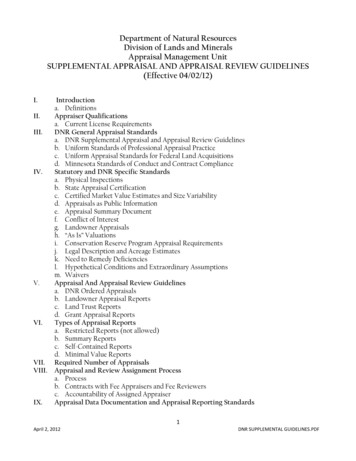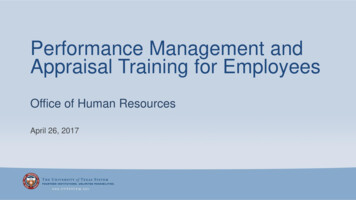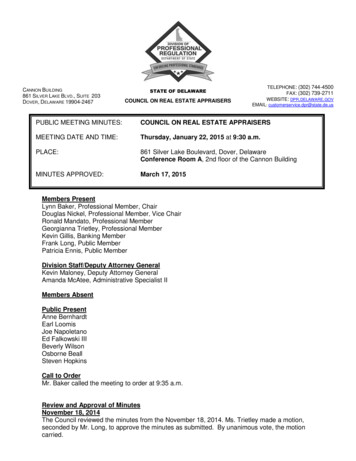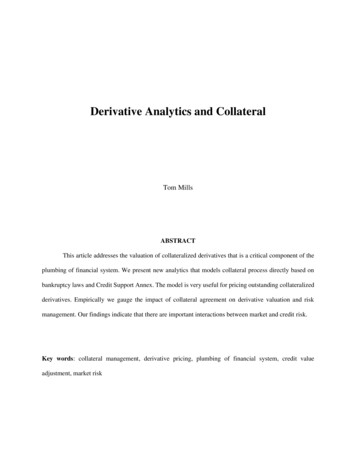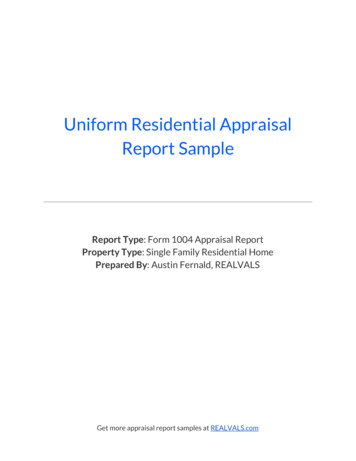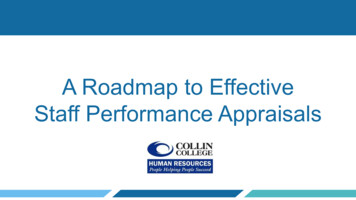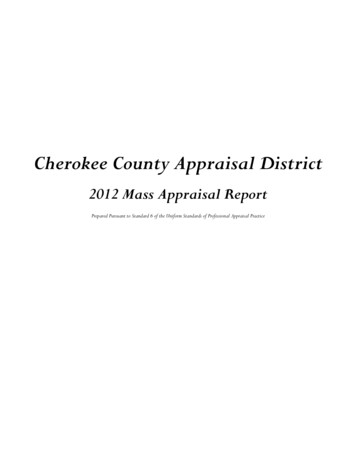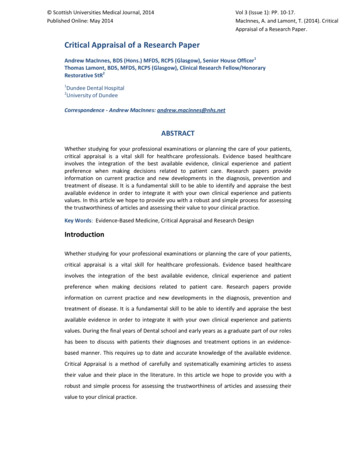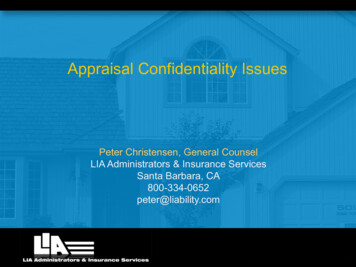
Transcription
Appraisal Confidentiality IssuesPeter Christensen, General CounselLIA Administrators & Insurance ServicesSanta Barbara, CA800-334-0652peter@liability.com
USPAP ConfidentialityUSPAP’s Ethics Rule re Confidentiality“An appraiser must not disclose: (1) confidentialinformation; or (2) assignment results to anyoneother than: the client; persons specificallyauthorized by the client; state appraiserregulatory agencies; third parties as may beauthorized by due process of law; or a dulyauthorized professional peer reviewcommittee .”
Other Sources of Appraiser Confidentiality Duties Confidentiality obligations in client and AMC contracts(which may then also be defined as confidentialinformation under USPAP). Example contract provision:“Confidential Information shall mean and include . . . all analyses,compilations, summaries, documents or reports prepared by theAppraiser . . . the fact of Appraiser’s performance of Services . . .this Agreement and the amount of Appraiser’s compensation forServices, unless disclosure in legally required.”
Other Sources of Appraiser Confidentiality Duties Professional organizations. Appraisal Institute:“It is unethical to disclose confidential information or an analysis,opinion, or conclusion specific to a service . . . to anyone otherthan: (a) the client and those persons specifically authorized bythe client; and (b) third parties, when and to the extent that theMember is legally required to do so by statute, ordinance, orcourt order; . . .” Privacy laws, Gramm-Leach-Bliley Act and state lawcounterparts.
When Do Confidentiality Issues Arise forAppraisers Performing Lending Appraisals?Near time of appraisal performance: When responding to inquiries or demands ofborrowers and real estate agents. When another party besides the “client” seeks to usethe report. Potential future issues – if CFPB revisits “appraisalportability.” Will that happen?
When Do Confidentiality Issues Arise forAppraisers Performing Lending Appraisals?Post-loan origination: When clients or other lenders/investors/insurers ask ordemand appraisers to provide information (like contentsfrom a work file) or assistance (like helping with a rebuttal)in connection with:§ Repurchase demands,§ Mortgage insurance denials, or§ Litigation. When appraisers need to defend themselves against legalthreats or disciplinary complaints by clients, borrowers,subsequent holders of the loan or other parties.
Frequent Points That Arise in these Situations “Client” means the client in the original report. Duty of confidentiality is owed to that client. When the client no longer exists, there is noclient to provide authorization. Purchasing a loan does not create a “client.” Neither does insuring the loan or paying a loss. Confidentiality provision applies tocommunications even with identified intendedusers.
Lender Frustration “We just want appraiser to defend his work” USPAP confidentiality sometimes serves as a shield orexcuse to appraisers who would simply rather not. In my view, USPAP does not necessarily block suchdiscussions with non-clients – “to third parties asauthorized by due process of law.” Regardless, just changing USPAP’s rule would notreally provide what lenders/investors want – which iscooperation, answers, defense.
What Do Courts Says AboutUSPAP Confidentiality Issues? Not much – only two published decisions touch onUSPAP confidentiality. Neither decision relates to the lender concerns. Despite what lenders sometimes say, there are nopublished court decisions holding that an appraisermay or must discuss confidential assignment mattersunder USPAP with a party besides the client. The two cases addressing USPAP confidentiality areinteresting anyway.
U.S. v. 2,091.712 Acres of Land, U.S. District Court,E.D. North Carolina 2010 Federal condemnation case. Government taking a restrictive easement over land adjacentto a Marine Corps air station. Government subpoenaed all appraisals by landowner’sappraiser of similar properties near military air bases andcivilian airports. Court ruled USPAP confidentiality did not provide basis forappraiser refusing to disclose appraisals.“The law does not afford an evidentiary privilege to professionalappraisers. Moreover, the USPAP rules themselves explicitlycontemplate the production of such documents to ‘third parties asmay be authorized by due process of law.’”
FDIC v. Broom, et al., U.S. District Court,Colorado 2013 Professional negligence case re alleged overvaluation by twoappraisers. Both appraised property for 1.9 million. FDIC demanded all priorappraisals of the sameproperty for differentclients by one appraiser. Appraiser objectedbased on USPAPconfidentiality. Court ruled appraisalsmust be produced.
Violations of USPAP Confidentiality Can Lead toBig Liability for Appraisal FirmsNegligence Action by Developer Against Appraiser WhoViolated USPAP Confidentiality. Lender engaged appraiser for prospective loan toshopping center developer. Viability was based on a key retail tenant. Lender could not make the loan. Appraiser started talking about project and his appraisalto other lender clients. Emailed appraisal to another lender.
Violations of USPAP Confidentiality Can Lead toBig Liability for Appraisal FirmsNegligence Action by Developer Against Appraiser WhoViolated USPAP Confidentiality. News leaked out and retailer became angry about thedisclosure of its expansion plans. Withdrew from lease commitment. Developer now could not complete the project and filedsuit against appraiser for negligence and breach offiduciary duty. Alleged damages greatly exceeded appraiser’s E&O. One of our largest settlements in 2013.
What Do State Boards Say?LIA’s experience: Appraisers who have asked state boards the common question“can I talk about the results of my appraisal with , who boughtthe loan from , which no longer exists,” have almost alwaysbeen told “no.” However, from 1000’s of disciplinary matters, we have never seenany appraiser regulator in any state seek to discipline an appraiserfor providing information for his or her own defense in a situationlike this or to rebut a negative review. My view – the generalized notion of "due process of law" as used inUSPAP includes within it the right of an appraiser to communicateabout confidential matters for the purpose of self-defense againstthreatened or filed legal actions and disciplinary complaints.
Unsettled USPAP Confidentiality Issues USPAP is vague in its phrase permitting disclosure to“persons specifically authorized by the client.”Ø Authorized by name?Ø Are classes of persons acceptable? USPAP doesn't define what the phrase “as authorized bydue process of law" means and the ASB has not providedspecific guidance.Ø Does it mean a subpoena?Ø Does it mean defending oneself against potential legalthreat?Ø Does it mean preventing the filing of threatened complaintto a state appraiser board?
Solutions – for Lender’s Problem Less about USPAP problem than aboutobtaining appraiser willingness to assist orcooperate. Even if confidentiality section were changed,USPAP would not force an appraiser to assist alender or provide a rebuttal. Lenders can effectively remove the“confidentiality shield” by authorizing parties towhom disclosure is permitted in engagementletters.
Solutions – for Lender’s Problem Obtaining cooperation takes willingness on thepart of the appraiser:Ø Contractual provisions may requirecooperation/assistance after appraisaldelivery; require work files to be kept longer;require production of files when needed.Ø Compensation can inspire cooperation.Ø As can overall better appraiser relationships.
Solutions – for Appraiser’s Problem Appraisers need clarification of confidentiality to bothassist lenders and fairly protect themselves. Even without USPAP change, appraisers can create afix for themselves if they use engagement letters andaddress the issue:“Client consents to and authorizes Appraiser to disclose informationrelating to the appraisal assignment(s), including information whichmay be considered confidential information, to third parties for thepurpose of Appraiser’s response to or defense of threatened or actuallegal or regulatory actions and for the purpose of seeking insurancecoverage.”
Solutions – Suggested USPAP ChangeReplace: “An appraiser must not disclose: (1) confidentialinformation; or (2) assignment results to anyone otherthan: the client; persons specifically authorized by theclient; state appraiser regulatory agencies; third parties asmay be authorized by due process of law; . . .”With: “third parties as authorized by the client or asreasonably necessary to defending against, or seekinglegal counsel in connection with, an actual or threatenedlegal, regulatory or governmental enforcement complaintor action; . . .”
Appraiser . . . the fact of Appraiser's performance of Services . . . this Agreement and the amount of Appraiser's compensation for Services, unless disclosure in legally required." . relating to the appraisal assignment(s), including information which may be considered confidential information, to third parties for the
